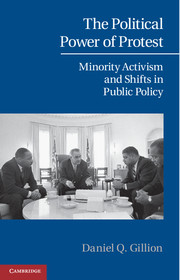Book contents
- Frontmatter
- Contents
- List of Figures
- List of Tables
- Preface
- Acknowledgments
- Introduction
- 1 A Continuum of Information
- 2 Measuring Information in Minority Protest
- 3 Viewing Minority Protest from the Hill
- 4 Knocking on the President’s Door
- 5 Appealing to an Unlikely Branch
- Conclusion
- Appendix A Defining Minority Political Protest
- Appendix B Study Description and Coding Across Multiple Institutions
- Appendix C Time Series Methods
- References
- Index
Conclusion
Settling Protest Dust in a Post-Racial Society
Published online by Cambridge University Press: 05 February 2013
- Frontmatter
- Contents
- List of Figures
- List of Tables
- Preface
- Acknowledgments
- Introduction
- 1 A Continuum of Information
- 2 Measuring Information in Minority Protest
- 3 Viewing Minority Protest from the Hill
- 4 Knocking on the President’s Door
- 5 Appealing to an Unlikely Branch
- Conclusion
- Appendix A Defining Minority Political Protest
- Appendix B Study Description and Coding Across Multiple Institutions
- Appendix C Time Series Methods
- References
- Index
Summary
You may write me down in history
With your bitter, twisted lies,
You may trod me in the very dirt
But still, like dust, I’ll rise
– Maya Angelou, “Still I Rise”
If we accept and acquiesce in the face of discrimination, we accept the responsibility ourselves and allow those responsible to salve their conscience by believing that they have our acceptance and concurrence. We should, therefore, protest openly everything ... that smacks of discrimination or slander.
– Mary McLeod BethunePolitical protest is a form of engagement that offers citizens an opportunity to voice their concerns. Minorities have turned to this form of political action during hard times to express their grievances to government. Piven and Cloward (1977) inform us that the benefits that follow from political protests are best realized by the economically disadvantaged and politically powerless. These are often racial and ethnic minorities (Lipsky 1970). One might conclude that racial and ethnic minorities benefit most from protest activities; this book has sought to see if, historically, they have benefited at all. Thus, this study has been guided by one central question: does minority political protest influence the actions and rhetoric of federal government?
- Type
- Chapter
- Information
- The Political Power of ProtestMinority Activism and Shifts in Public Policy, pp. 147 - 160Publisher: Cambridge University PressPrint publication year: 2013



